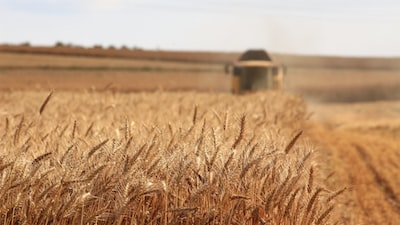
In a world grappling with the consequences of climate change and environmental degradation, the importance of sustainable agriculture has never been more apparent. The benefits of sustainable farming practices extend far beyond just the health of the planet – they also have significant impacts on our communities, our economies, and our own well-being.
From reducing greenhouse gas emissions to preserving biodiversity, sustainable agriculture offers a holistic approach to food production that considers the long-term health of our planet. With a growing demand for organic and locally sourced foods, the time is ripe to embrace the shift towards sustainable farming practices.
Join us as we explore the many benefits of sustainable agriculture and the positive changes it can bring to our world. Harvesting change starts with us – let’s pave the way for a brighter, greener future together.
Table of Contents
Introduction: Importance of Sustainable Farming
Farmers can maintain soil fertility, reduce the need for chemicals, and protect biodiversity by using techniques like crop rotation, cover cropping, and integrated pest management. Sustainable farming is holistic, recognizing the interconnectedness of natural systems and the importance of long-term stewardship. These practices not only produce healthier produce but also help combat climate change by trapping carbon in the soil. Embracing sustainable farming benefits both farmers and the planet, leading to a more resilient and regenerative agricultural future.
Health Benefits: Nutrient-Rich Produce
By focusing on soil health and fertility, farmers can ensure long-term productivity without relying on chemicals. This approach leads to healthier produce, protects biodiversity, and ecosystems. Sustainable farming emphasizes integrated pest management and crop rotation to control pests naturally. Embracing sustainable agriculture can bring economic benefits to farmers.
Though the transition may require investment and training, the long-term advantages outweigh the costs. Sustainable practices increase farm resilience to climate change, improving profitability and success. Taking a holistic approach to farming benefits the land, farm workers, and future generations, creating a more sustainable food system.
Environmental Impact: Protecting Ecosystems
Farmers can improve soil health, increase crop productivity, and protect ecosystems by using sustainable methods. These practices help minimize environmental damage, reduce reliance on chemicals, and promote biodiversity. Sustainable farming ensures safe food provision and preserves natural resources. Embracing sustainable methods also brings economic benefits. Although initial investment is needed, the long-term advantages exceed the costs. Sustainable practices enhance crop resilience, reduce costs, and boost farm productivity. Consumers are more interested in sustainably produced food, creating market opportunities for eco-friendly farmers. Prioritizing sustainability helps farmers secure stable incomes, enhance product value, and support a more resilient agricultural sector.
Economic Advantages: Long-Term Profitability
Implementing sustainable farming methods can help farmers build resilient and sustainable businesses that are better equipped to weather economic challenges and fluctuating market conditions. By reducing input costs, improving soil health, and fostering biodiversity, sustainable practices can lead to increased yields and higher-quality crops. Farmers can also tap into niche markets and command premium prices for sustainably grown produce, creating opportunities for enhanced profitability.
By investing in practices that promote soil health, conserve water, and minimize environmental impact, farmers can create a more stable and profitable agricultural operation. Additionally, adopting sustainable practices can help farmers access grants, loans, and support programs that are specifically designed for sustainable agriculture, further enhancing the financial viability of their farming ventures.
Call to Action: Embrace Sustainable Practices Today
Farmers can help preserve natural resources, reduce greenhouse gas emissions, and protect biodiversity by using sustainable methods like crop rotation, agroforestry, and integrated pest management. These practices not only boost soil health but also make crops more resilient to climate change, ensuring long-term productivity. Transitioning to sustainable farming is crucial for building a resilient food system. Sustainable practices can help farmers create a more stable food supply chain while meeting the rising demand for organic and locally grown food. Embracing sustainable farming will lead to a healthier future for both people and the planet, supporting a more resilient agriculture industry.
articly.ai taginfluencermarketing.ai tag
MORZART TRADING: Leading the Way in Global Trade with Innovation and Reliability
As we navigate the complex world of global trade, MORZART TRADING emerges as a beacon of innovation and reliability. Specializing in a diverse range of agricultural products and energy drinks, our partnerships with ATRAD Sales Limited and Morzart Trading Pty Ltd have solidified our position as leaders in the industry.
Our unwavering commitment to sustainable farming practices not only benefits the environment but also ensures the quality and freshness of our products. From farm to table, we strive to uphold the highest standards of integrity and excellence.
With MORZART TRADING, you can trust that you are receiving the finest agricultural and other products available on the market. Join us on this journey towards a more sustainable future, where quality meets responsibility in every transaction.
Frequently Asked Questions
Some benefits of sustainable farming practices include better soil health, reduced environmental impact, improved biodiversity, and long-term profitability.
Farmers can embrace sustainable practices by incorporating crop rotation, conserving water usage, using natural fertilizers and pesticides, and implementing integrated pest management strategies.
The Bottom Line
As we navigate the complexities of our modern world, it is clear that sustainable farming practices offer a pathway towards a more harmonious coexistence with our planet. From reducing carbon emissions to preserving biodiversity, the benefits of sustainable agriculture are vast and far-reaching.
By prioritizing soil health, water conservation, and ethical treatment of animals, we can ensure a future where food security is not sacrificed for profit margins. Embracing regenerative practices, like crop rotation and cover cropping, may seem daunting at first, but the long-term benefits for both the environment and our health are undeniable.
Let us strive to cultivate a world where sustainability is not just a trend, but a way of life.





